Kemp Gouldin knows it sounds crazy, that it sounds like someone who watched “Field of Dreams” a few too many times, but he swears it’s true. Kemp Gouldin brought baseball to Egypt because a voice told him to.
Gouldin, warm, charismatic and talkative, swears that he was simply driving across South Carolina one night in 2015, 1980s pop music playing on the car stereo, when it struck him: “Bring baseball to Egypt.” He saw the pyramids in his mind’s eye and he envisioned young children, bats and balls in hand, playing America’s pastime.
“So whether it’s divinely inspired, the universe speaking, or an amalgamation of all these life experiences that just coalesced into this germ of an idea, who knows?” Gouldin asked. “But the result has been remarkable, to say the least.”
Gouldin had experience working internationally and in the area. He was at least somewhat familiar with Egypt and had worked on translation software, so he understood the need to connect people across cultures. But never before had he harbored thoughts about bringing baseball to the country. Sure, he loved the sport, had grown up with the game, and later spent one summer as an intern in baseball operations with the San Francisco Giants, but this wasn’t the future he had planned for himself.
Thanks to that one night and whatever vision appeared in his subconscious or whichever voice traveled under the strains of The Police or Phil Collins on the car stereo, everything changed.
“It was such a simple idea, and it was such a clear, delineated idea,” Gouldin said. “Not paragraphs and paragraphs of stream of consciousness. It was a simple, direct idea.”
So, how does one go from hearing a cosmic voice in your head to actually bringing baseball across the globe?
First, he looked into the history of baseball in Egypt. While the voice may have told him to bring baseball there, perhaps the game had beaten him to it.
“My first thought was, surely this has been done,” Gouldin said. “And yes, it had been done in 1889 and 1914, so to know there’s a living history, almost thinking these were precursors.”
While Major League players had stopped during world tours in those two years, taking some of the most iconic photos in the game’s history with big leaguers posed in uniform upon the Sphinx, this was largely just a vacation for the players and a marketing expense for sporting goods dealer A.G. Spalding. There wasn’t any intent to lay the groundwork for the game to flourish along the Gift of the Nile.
However, there is another startling piece of evidence that shows perhaps the earliest ancestor to baseball in human history. There’s a relief wall from approximately 1460 BC which shows Pharaoh Thutmose III playing seker-hemat, or “batting the ball.” With stick in hand, the Pharoah is seen batting balls to two catchers and the goddess Hathor.
As Egyptologist Peter Piccione wrote, “The Egyptians were the earliest people known to play any ball games, let alone bat-and-ball, specifically (c. 2400 BC). Very early in their history they applied cosmological associations to their bat-and-ball game similar to the cosmology that Americans apply to baseball (e.g., as a rite of spring and a renewal of life, a conduit for channeling national political loyalty, a source of heroic figures with whose achievements society could identify, etc.).”
“What started as a simple, seemingly impossible, incongruent idea suddenly had all of these congruences and historical narratives around it,” Gouldin said. “That got me very excited, because really, what we’re doing is we’re not bringing baseball to Egypt, we’re bringing baseball back to Egypt.”
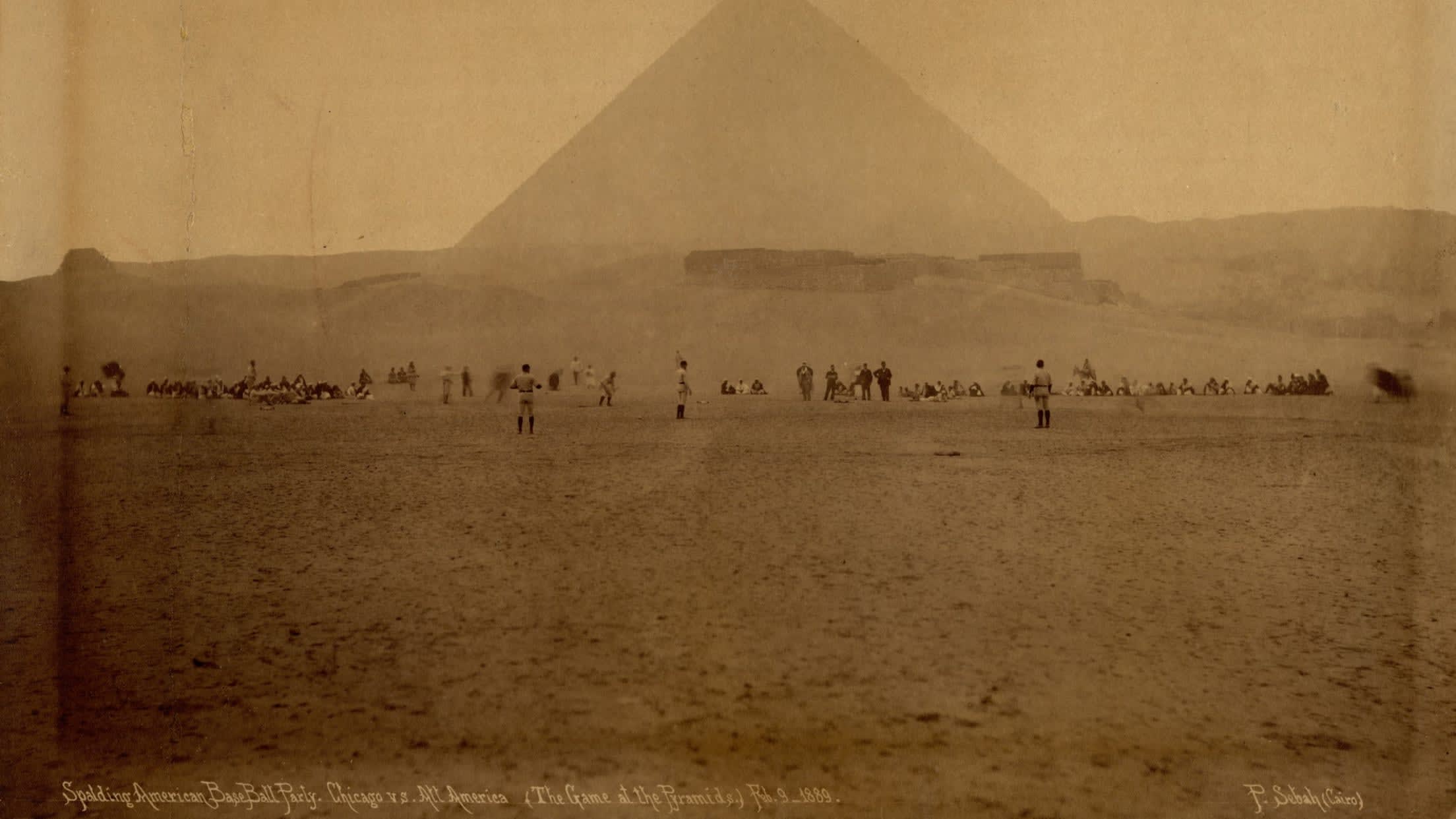
A photo taken during Spalding’s World Tour in 1889.
After Gouldin first started sharing his idea with friends and family, with many of them wondering if he actually was crazy – “I think you’d probably be a bad friend not to at least ask some questions. But some of my closest mentors and others said, ‘That’s just so crazy, it might work,’” – he then had to figure out how to actually, well, make it work.
He made calls to Major League Baseball, who were inspired by his vision and agreed to support his efforts as part of its Play Ball initiative. Gouldin contacted sporting manufacturers like Franklin, who agreed to provide equipment and balls, the very building blocks of baseball.
Gouldin’s next move was to connect with schools in Egypt and make his pitch.
“This is a gift from the baseball world to you, from MLB all the way down to the sporting manufacturers,” Gouldin told them. “They want to share this game that’s meant so much to us with you.”
With schools on board, it was time for Gouldin to get on a plane and see if that voice turned out to be accurate.
“I remember specifically thinking, ‘I can postpone this, I can make the calls to [cancel the trip],’” Gouldin remembers thinking as he boarded his flight to Egypt in the spring of 2017, “but at the end of the day, we had a team of documentarians going, we had other volunteer coaches getting on planes. There was enough of a sunk cost and a thought of, if not now, we can always find a reason to turn back. You’ve got to start somewhere.”
By the time Gouldin landed, 40 kids had signed up for baseball clinics, a number that would grow exponentially every time he returned. This was the start of Because Baseball.
***
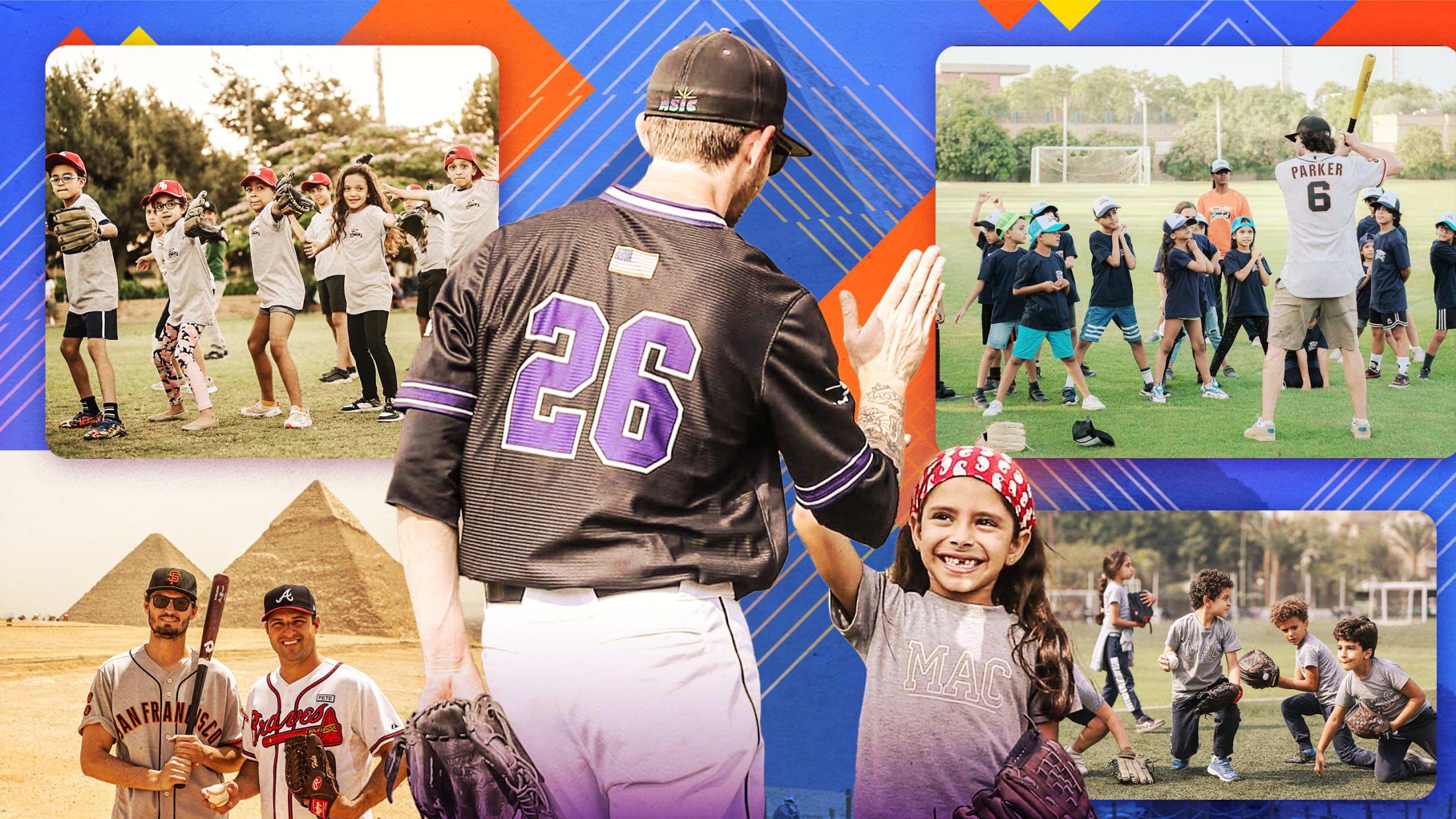
A common refrain you’ll often hear from baseball lifers is about how they want to give back to the game that’s given them so much. There’s a reason why veteran ballplayers help the young ones coming up behind them, even if it means hastening their own departure from the starting lineup.
It’s the same reason why Gouldin wanted to do this.
“Baseball had made the biggest impact in my life from playing with my mom and dad and those really important conversations that resulted from playing with my parents to playing with the kids in my neighborhood. What brought us together was not basketball, was not football. It was baseball,” Gouldin explained.
For those with a love of the game and a desire to share it far and wide, Gouldin’s pitch to bring baseball to Egypt couldn’t have landed better than the group of former Major Leaguers and highly respected coaches who wanted to make the trip.
Former big league pitcher Doug Simons had already traveled the world, playing in Italy and Venezuela, and has been coach at Covenant College since 2005. He leapt at the chance to take part.
“I love baseball, and it’s a chance to go to another culture and share baseball with this culture,” Simons explained. “I never thought I would ever be in Egypt at some point in my life, and this was a great opportunity to go there, experience a new culture and use baseball to make a connection with the people there.”
While most of the children had never seen baseball before, a few had a little experience … thanks to video games.
“One kid was really getting it, and he was speaking in Arabic,” Simons said. “I didn’t know what he was saying, but he was telling people where to go and all this. So, I came up to him, like, ‘Are you from America? Or did you play baseball before?’ He’s like, “No, I play MLB The Show.'”
Pirates prospect Termarr Johnson’s father, Terry, was one of the first coaching ambassadors to come over. He was soon joined by former big leaguer and KBO pitcher David Hale, who got on a plane and flew across the world to take part. Former Giants GM Bobby Evans did the same, as did slugger Giancarlo Stanton.
Jarrett Parker found his worldview changed after his first trip. After retiring in 2020, Parker stepped away from the game, looking to do something different than what had consumed every waking moment ever since he was a teenager. But after speaking with Gouldin, he agreed to come to Egypt and take part.
“After I did it, I realized I have this beautiful talent and skill – like a PhD in baseball,” Parker explained. “Why am I not giving this back to the world? Doing that camp, it sparked something in me and I realized ‘This is amazing.’ I just really enjoyed helping the kids.”

Jarrett Parker launches a ball into the Cairo night as Brian Jordan and a group of children look on. Photo courtesy Because Baseball.
A lover of travel, Parker returned the next year, but not for just one week: He came for an entire month. Three of those weeks saw Parker rising early every day and heading to a different Egyptian school, ready to provide instruction in a sport that few in the country knew or cared much about.
One moment in particular stands out in his memory. After spending the morning running instructional camps, the school broke for lunch. Looking for some quiet time, Parker grabbed his food and went to sit in the shade by himself before a couple of the children spied him and walked over.
“I was kind of quiet and they’re chatting with me,” Parker remembered. “One of the kids goes, ‘Did you come here just for this?’ I said, ‘Yeah.’ He looked at me in the eyes and said, ‘Thank you.’ Honestly, I would go for two months. Every day, something like that would happen that just made it worth it.”
Another Major Leaguer, Asher Wojciechowski, was the perfect person to hear Gouldin’s pitch. Wojciechowski’s parents were missionaries, so the youngster had spent some of his youth in Romania. When they first moved there, Wojciechowski thought his days of playing baseball were over until he found himself playing in the region’s small Little League program. But after retiring in 2022, Wojciechowski said he also found himself with a “complete loss of identity and what I was supposed to do next.”
“I knew I wanted to give back and I knew I wanted to get involved internationally again,” Wojciechowski – now the pitching coach for the Croatian national team – said. “It was just a great springboard for me on getting my confidence back and being able just to go somewhere and literally play with kids and teach them the game and see them smile. Seeing the ones where it clicked and all of a sudden, they’re throwing a baseball and catching a baseball, hitting a ball and all of a sudden, they’re smiling ear to ear. That really moved me and got me out of the little rut post-baseball.”
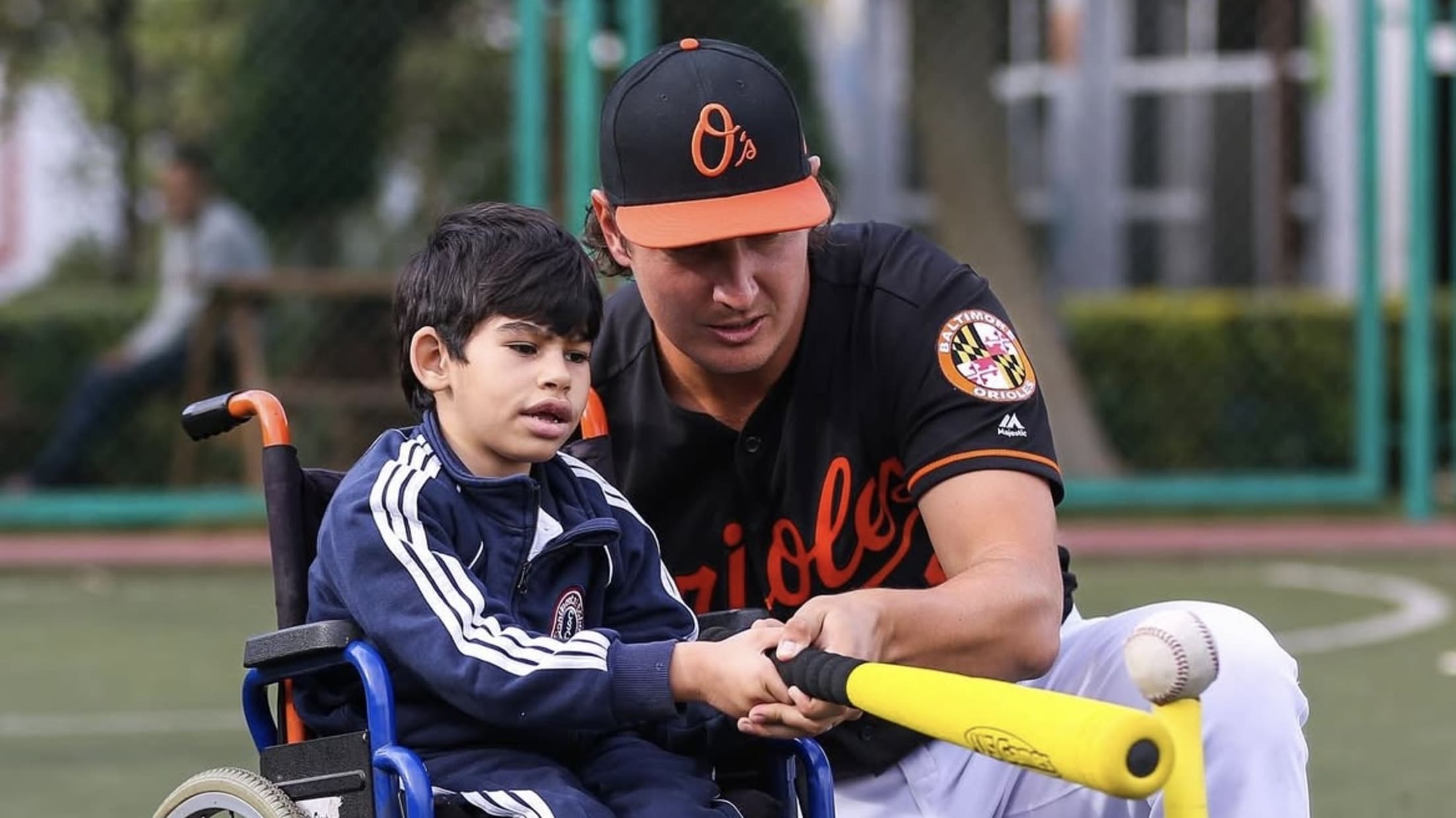
Asher Wojciechowski helps teach a young player how to swing.
The list goes on: Brian Jordan, the former MLB and NFL star, has spent his post-playing career involved in civic service through the Brian Jordan Foundation. He’s written children books and remains active in the Atlanta community. When given the chance to bring the game of baseball to kids in Egypt, he leapt at the opportunity.
“I love sharing and I love giving back, and if we can grow the game in Egypt, that would be awesome,” Jordan said. “So, I took on a challenge and had a chance to take my daughter with me, which was a lot of fun. It opened my eyes to how Egypt has no clue about the game of baseball, but it was fun trying to introduce baseball to the kids who are used to playing soccer. They were using the plastic bats for swords. They had no concept of the game, but it was really, really fun teaching the game, and just being in that environment.”
Gouldin’s dream of connecting the world through sport, of introducing people from a variety of backgrounds and belief systems though the game of baseball, was working.
“We’re going to Egypt, which is a primarily Muslim country, they’re not speaking English,” Parker said. ”But we’re going there to just share baseball and love. We’re bringing different cultures together.”
“It reminded me of when I was a kid and getting to try baseball for the first time,” Gouldin said about that very first trip. “At its most pure, baseball is just a sport of joy and connection and we were seeing that. There were these moms with hijabs and baseball caps hitting a ball, posing with their sons and daughters, the dads getting out there and playing with their kids. It could have been any Little League field in the U.S.”
***
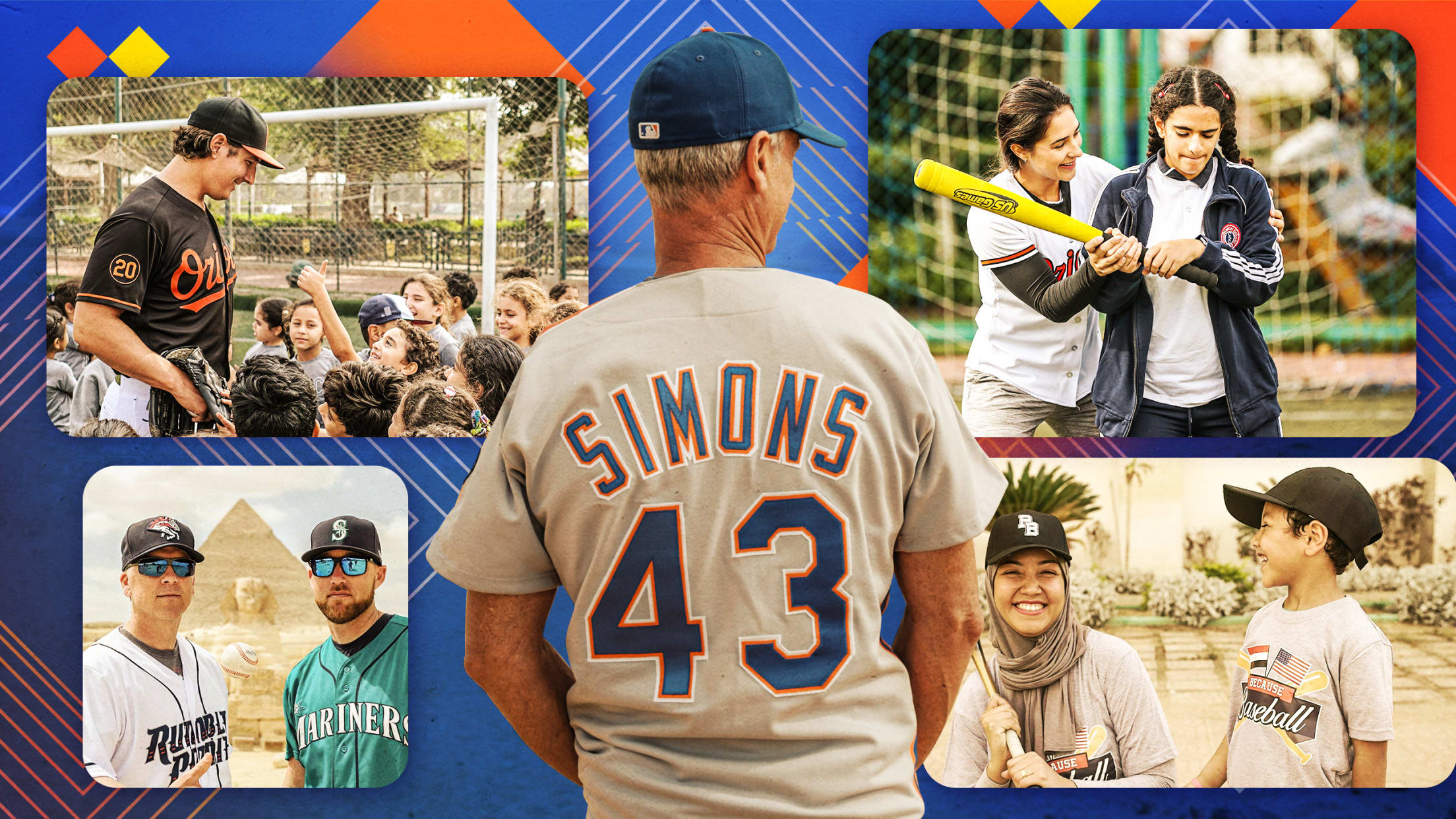
Soccer, like much of the world, is Egypt’s game. If you want to play other sports, that — also like in much of the world — requires money.
“If you have money in Egypt, you’re a member of these sporting clubs, and you have access to all sorts of sports,” Gouldin explained. “But for the vast majority of Egyptians, soccer is clearly the national sport.”
Gouldin’s aim wasn’t to simply bring baseball to those who could afford it, but to any and all children that he could reach. That’s why his mission saw him reaching out to schools and orphanages, places where the coaches and players’ time and attention could really make a difference.
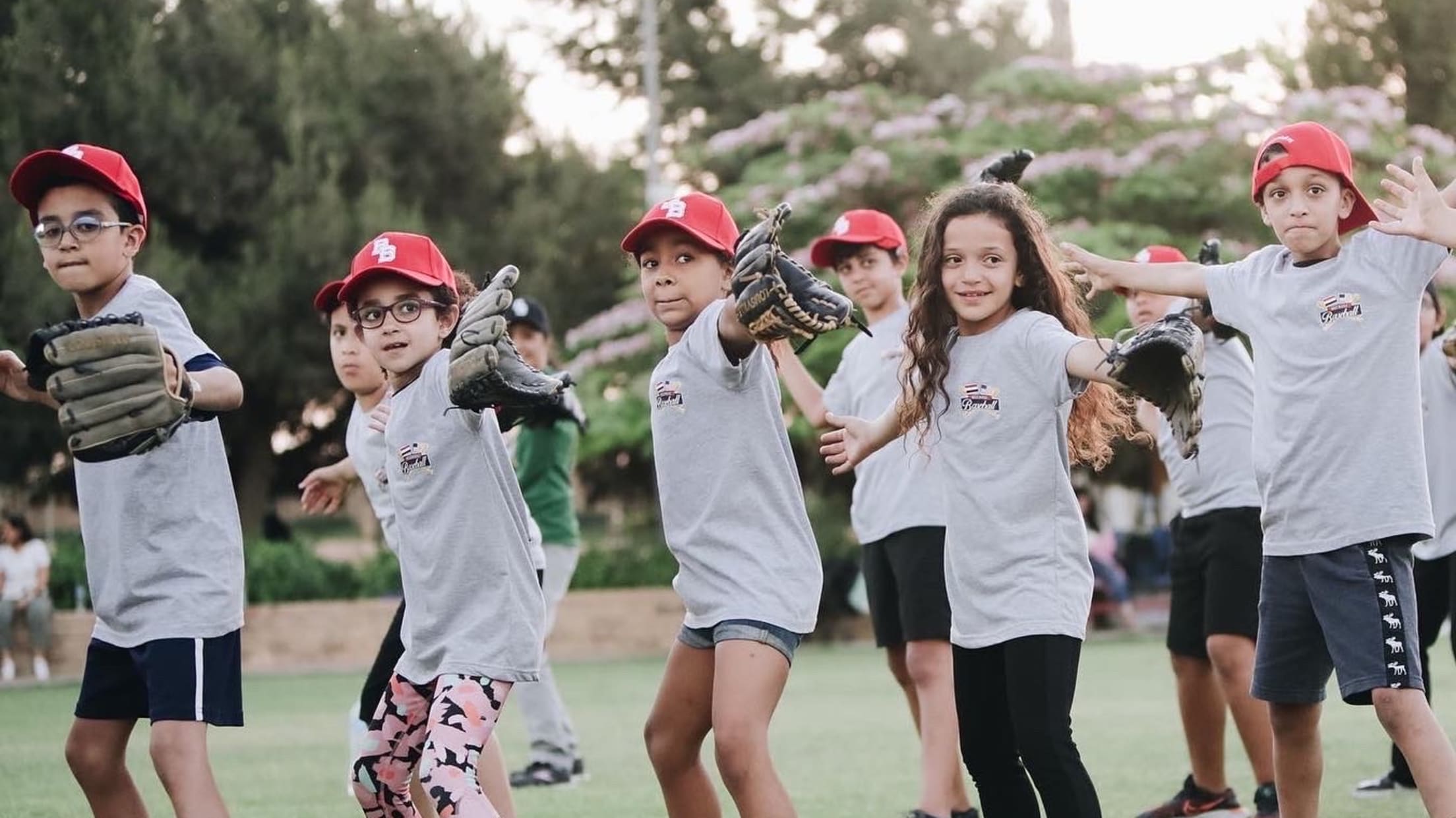
It’s also what brought Because Baseball to the Continental School of Cairo. Originally founded in 1994 as a school exclusively for children with special educational needs and disabilities, it soon expanded, bringing children in for mainstream education as well. Maey Elnimer, whose parents created the school for her sister, was driving when she heard Gouldin on the radio talking about his plan for Because Baseball and his mission to bring baseball to Egypt.
Though she knew nothing of the game beyond her experience with rounders as a student attending a British international school in Saudi Arabia, Elnimer – the Chief Academic Officer for the Continental School – quickly got in touch. She thought the Continental School, which had swelled to about 1,000 students and stood out from many schools in the area in how it mixed mainstream students with those who had special needs, would be the perfect candidate to host baseball.
“Sports in general, I think, is a great tool for inclusion, because you can have a lot of children who struggle in the classroom, but sparkle on the playground,” Elnimer said. “It’s so important to be able to share that with everybody. It sends a message of their capabilities as well, so that people looking at disabilities are looking at what children are actually able to do. Children, a lot of the time, are not affected by differences. This is something that people acquire as they get older, unfortunately.”
She pointed out to Gouldin how important it was to make sure the experience was enjoyable for all the students, regardless of physical ability. That wasn’t an issue.
“They took it seriously,” Elnimer said about the coaches. “It wasn’t just a matter of, ‘OK, let’s give those kids a good time.’ They were actually teaching them the correct posture and how to throw the ball, how to catch the ball, how to run around the bases.”
The effect on her students was immediate:
“What was astonishing was the reaction of our children to that,” Elnimer said. “Everybody was engaged. We had children in wheelchairs who were accommodated for. We had children with autism who were accommodated for. Everybody had a role to play and it worked.”
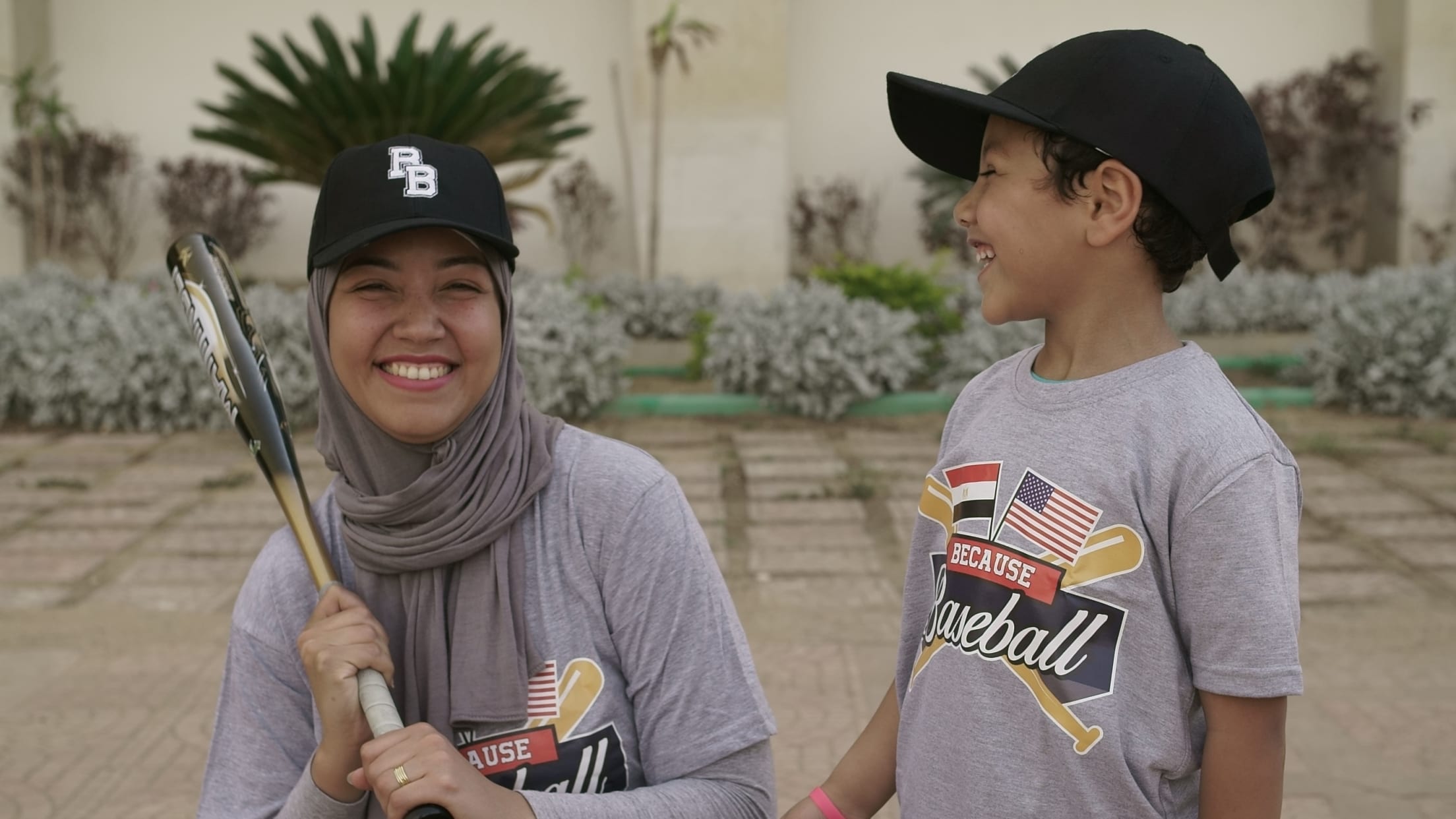
A young woman and boy enjoy playing baseball together. Photo courtesy Because Baseball.
One student, Hamza Hassan, who has been in attendance for all six years that Because Baseball has been coming to the school, has become particularly enamored with baseball. A young student with Down Syndrome, Hamza became fast friends with the coaches, finding immense pleasure in the sport.
“Hamza loves all parts of the game,” Shaimaa Hassan, Hamza’s mother, wrote in an email. “But he enjoys hitting and pitching more [than fielding].” While he doesn’t have a favorite MLB team, if you are one of the coaches or former big leaguers who have brought the game to him, you have a fan for life.
“He loves the coaches that train him at school,” Hassan wrote.
It’s not just the children who find meaning and joy in the work, though.
“I realized that since I was 16 years old, 110 percent of my life was baseball and I just walked away from it,” Parker said. “Starting with Because Baseball and seeing this and getting the joy from it, I realized I’m interested in sharing [the game] with youth, with the children. For me, it helped me realize a good purpose for myself, sharing this gift with the world.”
“What’s cool about a new sport like baseball,” Gouldin explains, “it offers almost a blank slate for these kids to play together. So, we have special needs kids. We work with the Special Olympics of Egypt. We’ve just got this really cool situation where kids from all walks of life and ability get to learn to play together.”
***
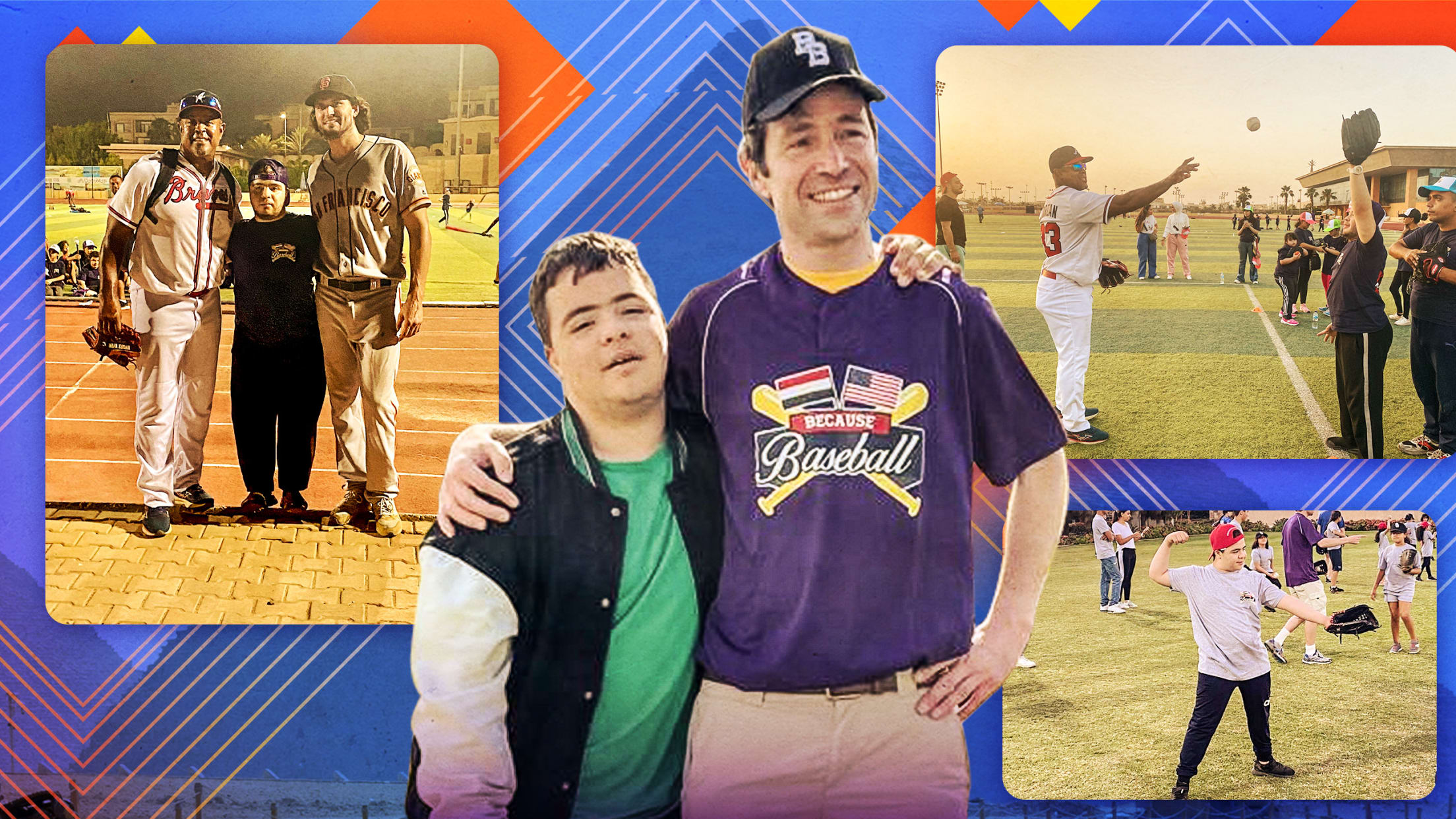
Hamza Hassan out on the field and with Kemp Gouldin. Photos courtesy Shaimaa Hassan.
What started as a hallucinatory vision in his car and later began with just a few dozen children on a soccer field in Cairo has exploded. 7,500 children across schools and orphanages in the Cairo area now participate each year as Gouldin and his team come by twice a year for five to six weeks at a time. The coaches and trainers work their way through schools and orphanages to teach the game. The children now look forward to the annual visits, to the chance to get out on the field, toss some baseballs, and meet people from around the globe.
“I think it puts it in perspective a little bit that yeah, people from around the world are so much alike,” Simons said. “I just loved the opportunity to get to know that culture and the people there using the game of baseball.”
This year, for Play Ball Weekend, Hunter Pence made the trip to Cairo, gleefully blasting home runs to an astonished crowd in his crisp, cream-colored Giants jersey. The main event took place at the American University in Cairo, with over 300 children in attendance that day alone.
“The passion of the kids, and the fact that several of them look forward to this all year, to pass out wiffle ball bats and Major League Baseball hats and watch the joy in their eyes, and to hear them screaming for baseball, [is incredible],” Pence said of the experience. “They want to play intense, competitive wiffle ball games right away.”
“The reality is, if I’m honest, I think I’m surprised at where we are,” Gouldin said. “I still have visions and hopes and excitement for what’s to come. I’m not sure if I had known how hard it was going to be, I would have embraced as much as I did. But I’m so grateful for the path that it’s taken. I don’t think I could have imagined we’d have this many MLB players who would want to be a part of something so special.”
Who knows what the future may look like, what a few weeks of baseball every year in Cairo can do for the game across Egypt. But as long as there are kids out there, picking up a bat and a ball, playing with a smile on their face, it will all be worthwhile.
“Just imagine if we can turn one of those kids into a Major League Baseball player,” Jordan said. “That would be phenomenal. I think the support is there. It’s just a matter of bringing the resources and having enough fundamentals, enough players, and enough people that really care about teaching these kids and making it happen.”
